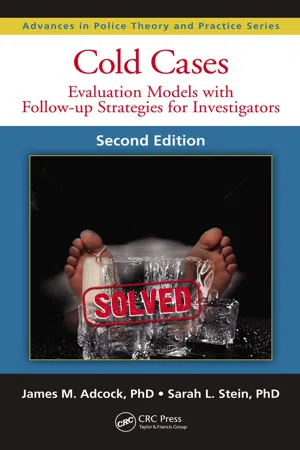
Cold Cases
Evaluation Models with Follow-up Strategies for Investigators, Second Edition
- 337 pages
- English
- PDF
- Available on iOS & Android
Cold Cases
Evaluation Models with Follow-up Strategies for Investigators, Second Edition
About this book
Because the investigation of cold cases is usually an arduous and time-consuming task, most law enforcement agencies in the United States are not able to dedicate the resources necessary to support the cold case investigation process. However, when those cases are fully pursued and prosecuted, they often result in convictions and lengthy prison terms. Cold Cases: Evaluation Models with Follow-up Strategies for Investigators, Second Edition saves law enforcement time by providing detailed guidelines for determining if a cold case is solvable, and if so, how to organize, manage, and evaluate the investigation. It also provides techniques for developing investigative strategies to complement the evaluation process and resolve the crime.
This second edition features a new revised model and methodology for investigating cold cases suitable for all police and public safety agencies—large or small, domestic or international. This new model is more expeditious and convenient for departments that have less manpower and experience in dealing with cold cases. It emphasizes the prioritization of cold cases based on the availability of physical evidence and the chances of deriving matches from said evidence and an identified person of interest.
Additional topics covered in the second edition include:
-
- How cases go cold
- Strategies for creating a cold case unit
- Cold case investigations in a Dutch educational environment—a chapter written by members of the Dutch Police Academy
- New forensic science technologies, including DNA, CODIS, and AFIS
- Case studies demonstrating advances in suspectology
- Strategies for effective investigative interviewing
- Challenges posed by staged crime scenes in cold cases
- How to craft a cold case evaluation report
The expert authors of this book maintain The Center for the Resolution of Unresolved Crimes and conduct training and consulting worldwide. Their practical book is designed to help law enforcement agencies resurrect long-forgotten cases, bringing closure to victims and holding accountable those who are responsible.
This book is part of the Advances in Police Theory and Practice series
Frequently asked questions
- Essential is ideal for learners and professionals who enjoy exploring a wide range of subjects. Access the Essential Library with 800,000+ trusted titles and best-sellers across business, personal growth, and the humanities. Includes unlimited reading time and Standard Read Aloud voice.
- Complete: Perfect for advanced learners and researchers needing full, unrestricted access. Unlock 1.4M+ books across hundreds of subjects, including academic and specialized titles. The Complete Plan also includes advanced features like Premium Read Aloud and Research Assistant.
Please note we cannot support devices running on iOS 13 and Android 7 or earlier. Learn more about using the app.
Information

Table of contents
- Front Cover
- Contents
- Series Editor’s Preface
- Acknowledgments
- Authors
- Introduction
- List of Figures
- List of Tables
- Chapter 1: What Is a Cold Case and How Did We Get Here?
- Chapter 2: Understanding the Process of Homicide and Those Who Kill
- Chapter 3: Creating a Cold Case Squad (Concepts for Initialization)
- Chapter 4: Introduction to Evaluation Models and Procedures
- Chapter 5: A Comprehensive Cold Case Evaluation Model
- Chapter 6: An Alternative Model for Evaluating Cold Cases
- Chapter 7: Cold Case Evaluation Model III : Missing Persons
- Chapter 8: Cold Case Investigation in an Educational Environment : The Dutch Experience
- Chapter 9: Applying Science and Technology to Cold Cases
- Chapter 10: Suspectology : The Development of Suspects Using Pre-, Peri-, and Post-Offense Behaviors
- Chapter 11: Investigative Interviewing : Issues and Concerns Relating to Cold Cases
- Chapter 12: Cold Cases and Staged Crime Scenes : Crime Scene Clues to Suspect Misdirection of the Investigation
- Chapter 13: Evaluation Reports and Legal Considerations
- Chapter 14: Conclusion
- Appendix A: Establishing a Police Gray Squad to Resolve Unsolved Homicide Cases
- Appendix B: Dutch Victim Assessment Form—Victimology
- Appendix C: Suspectology: Case Study 2
- Appendix D: Sample Cold Case Evaluation Report
- Appendix E: Cold Case Scholarly Sources—Annotated Bibliography
- Back Cover